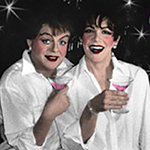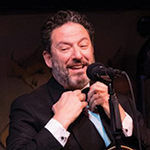Arlene Wolff
More Than You Know
The Triad, NYC, November 11, 2015
Reviewed by Rob Lester for Cabaret Scenes
 In cabaret, as we often try to explain to those for whom it is a foreign concept, singing is not just about the singing. It’s not just about the voice as an instrument being impressively rangy or powerful or even 100% reliably secure. Unlike the latest, barely adult, auto-tuned chirping chickadees in the passing pop princess parade seeking chart hits and YouTube hits, communicating serious life experience with a decidedly personal viewpoint counts most. Don’t just move. Move us emotionally. Arlene Wolff, returning to singing after decades, is an intriguing inspiration.
In cabaret, as we often try to explain to those for whom it is a foreign concept, singing is not just about the singing. It’s not just about the voice as an instrument being impressively rangy or powerful or even 100% reliably secure. Unlike the latest, barely adult, auto-tuned chirping chickadees in the passing pop princess parade seeking chart hits and YouTube hits, communicating serious life experience with a decidedly personal viewpoint counts most. Don’t just move. Move us emotionally. Arlene Wolff, returning to singing after decades, is an intriguing inspiration.
It’s a cumulative impact that can sneak up on you, as she charms with her sly humor, stories, survival skill set, and fortitude. Beneath the glamorous garb is bone-honest sincerity in singing. Behind the quips is a quiet self-assurance and dignity. She won’t bowl you over now with a vocal blast or bombast, but—like the staging in Stephen Sondheim’s Follies where we see the young showgirls of yesteryear materializing as as their older selves are center stage—we experience this lady in the present with the palpable presence of her past. Past husbands are also conjured up: “Mean to Me” means more. “More Than You Know” goes to the present one, the police commissioner she met as NYC Mayor Beame’s 1970s staffer.
“Falling in Love with Love” spoke volumes for the folly of how she, in her youth, confused real love with the concept/fantasy of it. Another Rodgers & Hart classic, “With a Song in My Heart,” was also ideal, directed to the audience. The evening clearly had gravitas as a dream come true for this woman for whom it and its reception meant so much, so I was even more pulled in. Dreams delayed that come to fruition can be all the sweeter and what she was finally tasting was palpably in the air, that kind of electricity and connection between appreciated performer and appreciative performer often heard about, rarely experienced.
Superb pianist Ian Herman, a frequent collaborator with the director, Scott Siegel, led a trio with extra care, attention, and obvious affection.
The night didn’t start off well. We could not hear Wolff’s voice consistently or its nuances on many words on many songs when the trio was louder because of a mic. Besides the chosen amplification—a clip-on mic instead of a standing mic or hand mic which can be raised or lowered. Doors for this show announced for 9 PM weren’t even open until twenty minutes past that hour; folks were cramped in the tiny lobby, standing in a line of the circular stairs, extended into the street on the late November night (which was, luckily, oddly mild). The music began after 9:45 – all because not enough time was built in after the earlier show to even consider booking a show at 9. I also mention this for a couple of reasons: The audience was remarkably patient, though hardly pleased, yet the performance was still received rapturously. Still, the reality is that it puts an extra burden on everyone to be tired, waiting, and getting out much later than expected (and, a semi-unrelated factor is that this was a lengthy show with an intermission!! We got out long after 11 PM). The delay was not the fault of the singer, band, or director (and understandably, a sound check was needed once the 7 PM play’s audience was gone). And I mention this because I’ve seen several delays at this venue for shows in the past—not to this extreme, certainly, but considerably long waits before seating and starting and serving. It’s not fair to anyone and certainly can’t be encouraging for customers to come back. The venue’s policy of making the post-show payments less of a crunch by bringing checks to tables before the conclusion may save them and patrons time on the other end, but it’s distracting to all and an insult to the singer as this we-can’t-wait wait-staff traffic comes during the last couple of songs and comments, which can be the most climactic or heartfelt pin-drop moments when one wants focus on the stage, not customers holding checks up to catch the light to read them, wiggling in seats to get wallets and purses, passing credit cards to waiters who then return with receipts or change while—by the way—a show is still going on.
By the way, remarkably, I’m told that the quite senior and quite unique Arlene Wolff was still very bright-eyed and energetic, huddling with her director as late as 1 A.M., discussing the show with zeal, ready for the next day and next booking. In her way, she may be younger than all of us.





